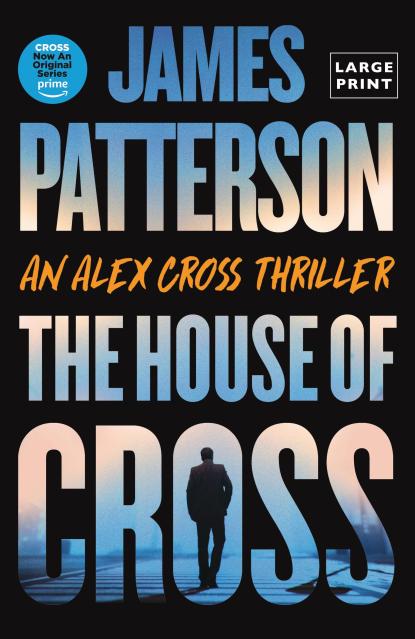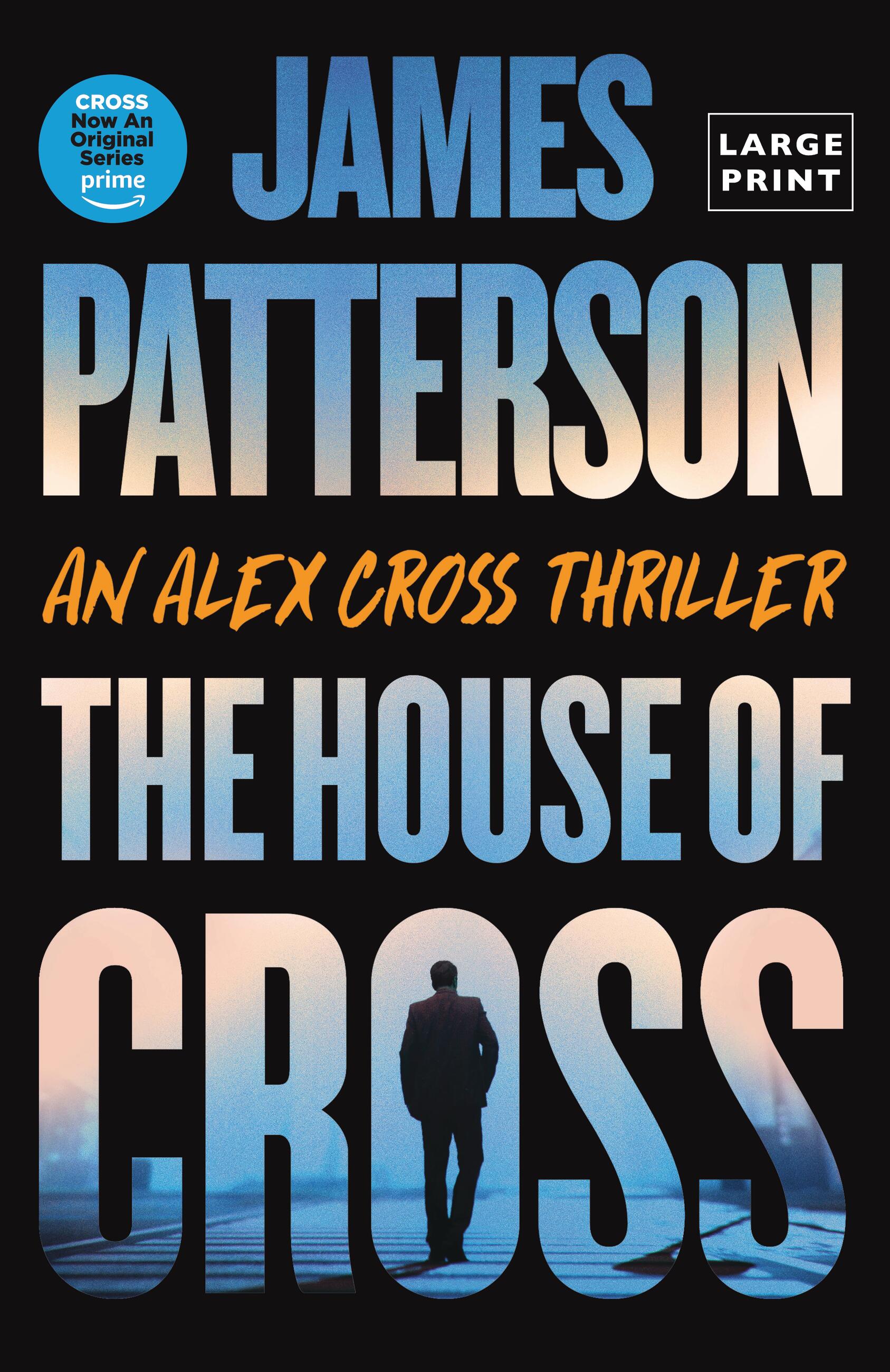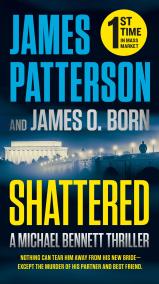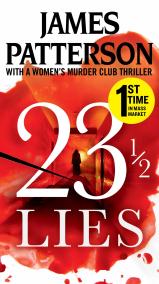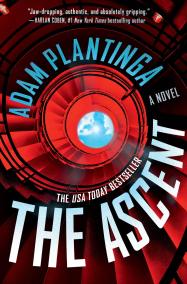Promotion
Use code CYBER2024 for 30% off sitewide + free shipping over $30
The House of Cross
Meet the hero of the new Prime series Cross—the greatest detective of all time
Contributors
Formats and Prices
Price
$32.00Price
$41.00 CADFormat
Format:
- Trade Paperback (Large Print) $32.00 $41.00 CAD
- ebook $14.99 $19.99 CAD
- Hardcover $30.00 $39.00 CAD
- Audiobook Download (Unabridged) $27.99
Also available from:
“[Alex Cross’s] innate nature is to protect people…If he has a weakness, it’s his family, especially his children. They’re the chink in his armor. But aside from that, it’s tough to get at him.”
–Aldis Hodge, star of Cross on Prime Video
In Washington, DC, the president-elect is planning her inauguration.
The list of Supreme Court candidates is highly confidential—until it becomes evidence in Detective Alex Cross’s toughest investigation.
One candidate is gunned down. A second is stabbed. A third is murdered near midnight on a city street.
Cross is the FBI’s top expert in criminal behavior. For the sake of his family, his city, and his country, he must put himself in the most dangerous place there is: inside the mind of a diabolical killer.
Genre:
Series:
- On Sale
- Nov 25, 2024
- Page Count
- 496 pages
- Publisher
- Little, Brown and Company
- ISBN-13
- 9780316580809
Book Trailers
What's Inside
CHAPTER 1
Independence Mountains, Northern Nevada
COMING DOWN THE ALPINE road in a wheelchair‑adapted van with Massachusetts handicap plates, Malcomb felt groggy, still heavy-headed from the drugs, but also anxious and sweaty.
He glanced in his rearview and caught a glimpse of big sections of the dirt road winding along the rim of a canyon that fell away to his left.
Not back there yet, Malcomb thought hazily. But he’s coming for you. Expect nothing less now.
He was afraid then and checked the van’s large operating screen. He saw on the active navigator that he was on a U.S. Forest Service road, heading north and downhill toward a flat ribbon of highway far in the distance. He glanced right at the little metal wallet and the iPhone on the passenger seat and cursed when he saw no bars on the screen.
Then he checked the gas gauge and was shocked to see he had less than a quarter tank. That son of a bitch! He wants to limit how far I can go. But screw him. I can make that highway wherever I am. I know I can.
The road got very steep and twisty just ahead. Unsure of the controls, Malcomb squeezed the handbrake on the steering wheel, glanced in the rearview again, and headed into the first curve. Still nothing behind him.
He made it down through back‑to‑back S‑curves just as snowflakes began to fall from the leaden sky. He hit a short straight, squeezed the gas control, and didn’t look at the rearview again until he had to use the brakes to enter another corkscrew.
This time he caught a glimpse of them exiting the upper part of the S, a half mile back.
The blue Tahoe, he thought, trying to breathe, trying to stay calm, trying to tell himself he could make it to the highway.
But with only a quarter of a tank? And what happens after I get there?
Will I have cell service? Will anyone believe the story I have to tell?
Malcomb heard a thumping sound. He looked in the rearview and almost lost it. They’ve got the helicopter!
He looked at the cell phone screen again, saw one bar. “Tor message, Siri,” he said. “Voice.”
“Tor activated,” Siri said. “Recipient?”
“Cross,” he said, glancing again in the rearview but not seeing the chopper. “Alex Cross.”
“Start message on the beep.”
“Dr. Cross,” Malcomb said as he reached the third and final series of S‑curves. “There’s a good chance I will not survive. There are things I want to tell you so that you may bring to justice those responsible for my death. First, you know me as —”
The thumping came again, louder this time. Panicked, he accelerated into the first turn of the last S. He came around the apex of the turn, and to his shock the Bell Jet Ranger helicopter rose up out of the depths of the canyon to his left.
The blue and white chopper hovered in the falling snow. The man in the copilot’s seat wore headphones and sunglasses, but he was without a doubt Malcomb’s double.
Then the tail of the bird drifted. There was a man in a harness tethered to the interior roof hanging out the side, one foot on the strut, shouldering a military‑style rifle.
Malcomb did the only thing he could think of and squeezed the gas control. The van went shooting out of the first curve in that final S and grazed the canyon wall with the passenger‑side door, sending a shower of sparks into the falling snow.
He glanced at the sideview, saw the helicopter turning to follow him. He shouted, “They’re coming for me, Cross. You know my brother, but —”
The helicopter roared up behind him as he reached the last tight turn in the road. He ducked a little, looked in the sideview, and saw the bird coming fast, the gunman hanging out of it.
As he came out of the turn, he saw the road ahead was blocked by a big dump truck with a snowplow. Without thinking, he slammed on the brakes and tugged hard left on the wheel.
The van smashed into the guardrail going fifty‑plus. The bumper caught the rail and hung up on it, causing the rear of the van to catapult up and over.
Malcomb screamed and caught an upside‑down image of the bumper tearing free of the rail. The helicopter came into view as the van fell. It caromed off the side of the cliff, plunged another two hundred feet, and hit a pile of rocks.
The gas tank exploded. The wreckage began to burn.
Back up on the cliff, a woman wearing a tan sheriff’s uniform and a heavy coat came out from behind the snowplow; she was followed by an older guy in coveralls. They went to the edge and looked down at the van burning, sending black smoke up through the snow.
“Didn’t expect that,” the plow driver said. “But it’ll work.”
The deputy nodded, picked up her radio, clicked the mic button, and looked up at the helicopter swinging away.
“That went easier than we thought, sir,” she said. “And the new snow won’t hurt our cause none.”
•••
CHAPTER 2
Washington, DC
AT SIX P.M. ON a mid‑December day, Emma Franklin hurried out of the elevator and down a long hall in the basement of the Prettyman U.S. Court House. The tall forty‑six‑year‑old carried a purse and a leather briefcase and wore a long gray puffy coat over her navy‑blue pantsuit.
Franklin pushed through the door into the annex garage and was relieved to see her ride waiting. The driver, a tall redhead in her late thirties, jumped out of the Cadillac town car.
“Good evening, Judge Franklin,” she said, coming around to open the rear passenger door.
Franklin smiled. “How are you, Agnes?”
“Outstanding, ma’am. And you?”
“Just peachy,” the judge said. She climbed in and put her attaché case and purse on the seat beside her.
Agnes closed the door, got in the driver’s seat, and turned on the car. “I don’t hear that expression — ‘just peachy’ — too often.”
Franklin laughed. “It was something my grandmother used to say.”
Agnes put the car in gear and drove to the exit. “She lived in Georgia, ma’am?”
“Valdosta,” Franklin said. “Pretty place.”
“Had to be warmer than here,” the driver said, pulling by the guard shack and out onto C Street. Snow had begun to fall.
“I heard it’s going to be sixteen degrees tonight,” the judge said, and involuntarily shuddered. “Older I get, the more I can’t stand the cold.”
“I hear you,” Agnes said. She took a right on Third Street and headed south. “Days like today, I’m thinking Miami.”
“I’ll be there for Christmas.”
“Lucky you.”
“My brother bought a place and invited my sisters and their families and me.”
“That’s nice for you. First year after and all.”
Franklin smiled sadly and nodded. “How’s the divorce going, Agnes?”
“I keep telling myself I can see the finish line.”
Judge Franklin looked out the window at the Christmas displays, her mind flickering with memories of the prior December, walking at night in Alexandria, admiring the lights with her late husband, Paul. What a difference a year makes.
“What do you think of Sue Winter’s pick for attorney general?” Agnes asked.
Franklin turned, happy for the distraction and change of subject. “She made a solid choice in Malone. Impeccable record when he was U.S. attorney in Phoenix.”
“I was surprised she didn’t pick a woman,” Agnes said.
The judge shrugged. “Sue’s from Arizona and worked with Malone. And State and Defense have already gone to women.”
“I say load the entire cabinet with women. The more the merrier.” Franklin chuckled. “I like the way you think.”
As they crossed the Fourteenth Street Bridge, the driver asked, “Are you going to the inauguration?”
“Absolutely. Wouldn’t miss it.” “What about the inaugural balls?”
Franklin looked out the window at the inky darkness of the river. “I haven’t decided if I’m ready for that yet.”
“Understandable, ma’am.”
The judge nodded and looked at her left hand, wondering when the time would be right to take off her wedding band. It had been almost nine months now.
They drove on in silence.
Ten minutes later, Agnes turned onto Franklin’s quiet street in Alexandria.
In the headlights’ glare, through the snowflakes, she saw a powerfully built, short‑haired blond woman running down the sidewalk in a warm‑up suit with a reflective vest, a neck gaiter, a fleece headband low over orange‑lens safety glasses to block the snow, and one of those hydration backpacks. As they passed her, Franklin saw she wore a headlamp as well.
Agnes pulled into the drive of Franklin’s bungalow. “Home again, home again.”
Franklin looked at her dark house, said, “Jiggety‑jig.”
Agnes left the headlights on, came around the back of the car, and opened the door. “Same time in the morning, Judge?”
“Fifteen minutes earlier, please,” Franklin said, climbing out with her briefcase and purse.
“Judge Franklin!”
Both the judge and the driver turned to see the blond runner on the sidewalk just a few yards away, her headlamp aimed down and between them. She was squared off in a horse stance, gripping a pistol with a suppressor with both hands. She said something, though Franklin did not catch the words.
“Why are—” Franklin managed before the woman shot her twice, once between the eyes, once over her right eyebrow.
Agnes spun, tried to run. The woman shot her twice between the shoulder blades, then bent over and retrieved the knapsack and the four shell casings from the sidewalk. She stuffed the casings and the gun in the little pack, zipped it up, put it on. She pushed hard against the left side of her neck, felt it crack, and jogged away.
•••
CHAPTER 3
I WAS HOME, FINISHING the dishes, when Ned Mahoney called.
Mahoney was the supervising special agent in charge of an elite FBI unit that worked high‑profile investigations. I was a consultant to that unit, focusing on criminal psychology.
“What’s up?” I asked.
“We’re not going to Boston in the morning, Alex.”
“C’mon.” I groaned. “This is the third time we’ve postponed going up there.”
“Yeah, well, we’ve caught a major one. Judge Emma Franklin, only Black woman on the DC Court of Appeals, and her driver were gunned down in Franklin’s driveway in Alexandria about an hour ago. The acting director wants us on it pronto.”
Aaron Gleason, the prior FBI director, had died of a massive stroke two days after the election. The lame‑duck president had named Marcia Hamilton, a former U.S. attorney for Chicago, as acting director until the incoming president took office.
“Jesus. Text me the address. I’m on my way.”
I hung up and turned around to see my wife, Bree, standing there with her arms crossed and a scowl on her face. “On your way where? And you’d better say Boston.”
I held up both palms. “This is out of my control.” “This is the third time we’ve put it off!”
“A District Court of Appeals judge, Emma Franklin, was just gunned down in her driveway and the FBI director wants us there,” I said.
Bree softened. “Franklin? Didn’t her husband die recently in a plane he was piloting?”
I nodded. “Got into wind shear and went down in the Chesapeake last spring.”
“This is going to set the city even more on edge than it already is with the inauguration coming up.”
Before I could reply, my phone buzzed, alerting me to the text. “Go,” Bree said. “Maybe we’ll get to Boston before the inauguration.”
“We can only hope,” I said, giving her a kiss. “Don’t wait up.” “Maybe,” she said, and kissed me back.
I left the kitchen and went through the dining room and down the hall, past the front room where Nana Mama, my ninety‑ something grandmother, was on the couch watching a documentary on rock and roll drummers. My daughter, Jannie, eighteen, a freshman at Howard University, was home after finals and sit‑ ting on the couch with her laptop. Ali, my youngest, was on the floor studying a math textbook.
Nana Mama looked over and saw me. “You ever watch this? I guess I never knew how influential Ringo was to generations of drummers.”
“Sounds like a good one, but duty calls,” I said.
My grandmother frowned. “I thought you were going to Boston in the morning.”
“Not anymore,” I said.
“Bundle up, Dad,” Jannie said. “Gonna be freezing tonight.”
“I heard that,” I said. I went to the front hall closet and took out a down jacket, a hat, gloves, and my credentials, then retrieved my pistol in its holster from the lockbox there.
Twenty minutes later, I pulled up and parked by an Alexandria police cruiser. A length of yellow tape had been stretched across the road to seal off the crime scene. Despite the cold, there were neighbors out on their porches up and down the street.
Ned Mahoney, a fireplug of a man in his late forties wearing an FBI windbreaker over a heavy jacket, was on the sidewalk in front of the bungalow looking at the bodies. Judge Franklin was on her back, slack‑jawed, one bullet hole between her open eyes, another above her right eyebrow. Her briefcase and purse lay beside her.
The driver, who had been identified as thirty‑seven‑year‑old Agnes Pearson of Bowie, Maryland, was sprawled facedown on the driveway, two bullet holes through the back of her black wool overcoat.
The car was still running.
“Pretty sharp shooting even at close range,” Mahoney said. “Double tapper,” I said. “Casings?”
Mahoney shook his head. “Looks total pro to me.” “Me too,” I said. “Who found her?”
“Cop said the lady across the street saw them lying here when she took her dog for a walk. I haven’t talked to her yet.”
I looked over and saw an older woman dressed for a blizzard sitting on her front porch and smoking a cigarette, a small dog in her lap.
After a criminalist arrived and photographed the scene, we shut the town car off, put on gloves, and went through the judge’s purse. We found her wallet, credit cards, two hundred in cash, her cell phone, and the keys to her house.
The briefcase was unlocked. In it was a laptop, legal briefs relating to a case she was hearing, and four tickets to a Miami Heat home game against the LA Lakers on December 23.
“I think we can safely assume they weren’t killed as part of a robbery,” Mahoney said. “I’m going to go through the car.”
“I’ll talk to the lady with the dog.”
The little black‑and‑brown shorthair dachshund wore a Christmas sweater and was snuggled in the lap of the smoker. He growled when he saw me approach.
“Hush now, Bernie,” the woman said.
“I’m Alex Cross,” I said. “I work with the FBI.”
“Eileen Dawson,” she said, then coughed. “And I know exactly where I’d start if I were investigating this.”
“Where’s that?”
“George Washington University Law School,” she said. “Professor Willa Whelan. She hated Emma’s guts, made all sorts of threats against her at a fundraiser at the Hilton not two weeks ago.”
“How do you know that?”
“I was an eyewitness.”
•••
CHAPTER 4
THE ALARM ON MY phone went off at eight thirty the next morning. I’d gotten home around two. I forced myself out of bed and into the shower.
I was in the bathroom shaving when Bree came in, carrying coffee and the Washington Post and looking as frustrated as I’d ever seen her.
“I can’t believe it,” she said. “I knew we should have gone to Boston two weeks ago when we had momentum.”
“What’s going on?”
“He’s dead.”
“Who’s dead?”
“Malcomb.”
“C’mon!”
She showed me the headline on the front page of the paper’s business section:
Reclusive Billionaire Dies in Nevada Accident
Beneath it was a picture of Ryan Malcomb, dead at the age of forty‑eight. He’d founded Paladin, a data‑mining company based in suburban Boston that did contract work for federal security and law enforcement agencies, including the NSA, the CIA, and the FBI.
I flashed on Malcomb, whom I’d met on several occasions, seeing him in his wheelchair explaining how his remarkable proprietary algorithms were able to sort through stupefyingly large amounts of raw data and home in on specific subjects.
“Read it to me,” I said, rinsing my face.
Malcomb, the story said, had been on a sabbatical of sorts for the prior two months and had crashed his van on a remote mountain road during a snowstorm.
A graduate of MIT, Malcomb had been stricken with muscular dystrophy as a teenager, which put him in a wheelchair much of the time. He had been traveling alone around the West in a van adapted for his use, looking for ranch land to buy, and had apparently lost control of the vehicle in the remote Independence Mountains, northwest of Elko, Nevada.
Elko County sheriff’s investigators said Malcomb had skidded on a notoriously bad turn and hit the guardrail; the vehicle flipped into a canyon and caught fire.
“‘The van’s VIN and the handicap plates identified the vehicle as Malcomb’s, and the billionaire’s Massachusetts driver’s license survived the fire in a metal wallet,’” Bree read. “‘The Elko medical examiner will take DNA samples of the remains found and seek dental records to confirm the identity of the billionaire, as the crash victim’s body was burned beyond recognition.’
“‘According to an Elko real estate agent, who asked not to be named because of a nondisclosure agreement with Malcomb, the day before, the entrepreneur had visited a ranch at the top of the same canyon he died in.’”
I shut off the water. “What’s the company saying?”
Bree read, “‘Steven Vance, the CEO of Paladin, said he and the rest of the company’s four hundred employees were in shock. He added that Ryan was their visionary and that without him, there would’ve been no Paladin.’” Bree stopped, turned the page. “Vance also said, ‘This loss is enormous. He is irreplaceable.’”
She tossed the paper onto the counter. “So that’s the end of the story. M is dead. He got away with all of it.”
“We still can’t say Malcomb was M,” I said.
“Of course he was. Who else could have run something like Maestro? Like Sampson always said, it had to be someone who had access to all sorts of law enforcement and national security files. No one had more access than Malcomb.”
John Sampson, my best friend and former partner when I worked full‑time at DC Metro, had taken his young daughter, Willow, to Disney World for the week. And it was true that John had been the first to suggest that Maestro must have access to top secret files. That had led to our early suspicions about the vigilante group, which was headed by a mysterious character who called himself M.
At times, M had helped us, sending us leads on various investigations. At other times, he had hindered and taunted us. And he had tried to have me and Sampson killed when we were on a wilderness rafting trip in Montana.
In the wake of that trip, Bree, who used to be DC Metro’s chief of detectives, had become obsessed with finding M and taking down Maestro.
“There’s more evidence right in that article that Malcomb was M,” she said. “He started his sabbatical two months ago, which was about the time I began suspecting him.”
That was also true. Prior to that rafting trip, M and Maestro had been involved in the killing of U.S. drug agents and the leaders of a Mexican drug cartel that had corrupted them. More recently Maestro had been behind the murders of several pedophiles and a famous fashion designer who had been involved in human trafficking. Evidence we’d gathered during those investigations had led Bree to the conclusion that M was Ryan Malcomb. “The FBI still has to look into him,” Bree said. “We need to know for certain that he was M. Or I do, anyway.”
“Good luck,” I said, heading to the closet. “I don’t think Ned’s going to get a whole lot of traction with that idea now that Malcomb is dead and a federal judge has been murdered in a professional hit. I mean, with the inauguration coming up, this murder puts us all in the hot seat.”





